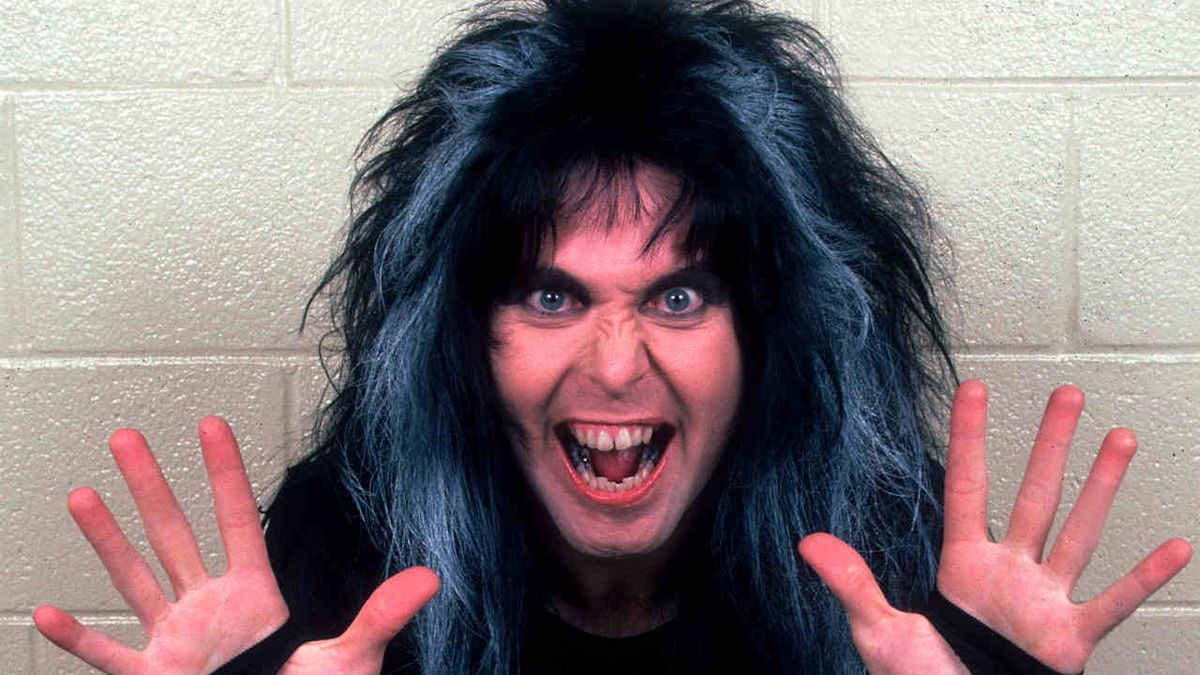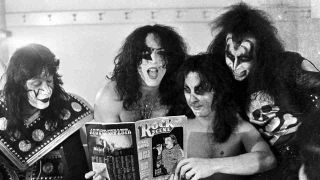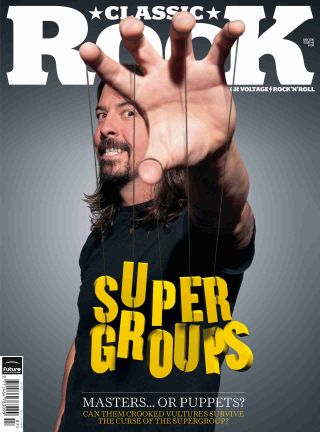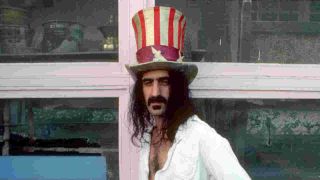“Arnold Schwarzenegger wanted to talk to me. They thought I would be right for the part of The Terminator”: WASP frontman Blackie Lawless’ wild tales of Lemmy, Gene Simmons and The Village People

When WASP formed in 1982, they were the bastard children of Kiss and Alice Cooper, with frontman Blackie Lawless’s meat-chucking, codpiece-wearing antics and songs such as their infamous debut single Animal (Fuck Like A Beast) attracting the ire of the PMRC. They’ve evolved plenty since then, not least Blackie himself, who became a born again Christian in the 2000s. When Classic Rock spoke to him in 2010, he plenty of rock’n’roll stories to tell, from nearly getting into a brawl with Lemmy to almost becoming the Terminator.

Alice Cooper
This was back in the days before security was really tight at shows. At 16 or 17 years old you would show up before the show and help the road crew move cases around so they wouldn’t throw you out. It was the Killer tour, and I stood about six feet behind the gallows when they hung Alice. I could see the whole thing, how it was being done, seeing the whole magic trick unfold. And at 16 years old I was gaining much more than a magic trick, I was looking at the owner’s manual of what would go on with my career down the road.
New York Dolls
I was there so little, I only did a couple of shows with them. I was 19 years old. And I was stunned because it was like five guys all trying to be like Jim Morrison and succeeding.
[Late bassist] Arthur Kane was a friend and I respected him as a musician – a far better musician than people knew. But he had a big-time alcohol problem. When I tell people about the Dolls, the time spent with Arthur is really what I’m talking about. Much more has been made out of my time with the Dolls than should have been. The big thing for me was it got me from the East Coast of the US to the West Coast.

Ace Frehley
He’s been a long-time friend, since we were kids. Ace taught me how to show up backstage before a show and help the roadies, to get into concerts. He got to see Hendrix that way. A short while later I got to see Kiss being born.
Gene Simmons
Gene was one of my earliest mentors. Kiss was on the road, they were doing their first tour, and I called Ace up one night. He wasn’t there, and Gene just happened to answer the phone and we just started talking. Gene asked me what I was doing with this band I was in. I told him that I’ve had a bellyful and had enough. He goes: “Let me tell you something. You’ve got that ‘it’ thing. Don’t quit. Those guys you’re playing with? They’re all losers. Get rid of ’em. When I got off the phone I felt energised and thought, maybe I can do this!
Village People

Can’t Stop The Music [1980 Village People movie] was before WASP and we needed the money. [Original WASP guitarist] Randy Piper, myself and a couple of guys we were playing with at the time went down for this. I think Randy had the contact to get us in the movie. Alan Carr [producer], who was hot off his Grease success, was looking to put this thing together with [athlete] Bruce Jenner [now Caitlin Jenner] and the Village People. They were looking for some ‘metal’-type guys, so we just got dressed up as if we were going out at night and went down. They called us in the room, and Alan looked at us and said: “They’ll do.” As we were walking out he remarked: “I love those costumes they’re wearing. They wore them specifically for this audition!” I turned around, looked him in the eye and said: “We aren’t wearing costumes.” The blood just drained out of his face when I said that. I wasn’t trying to be funny, I was just telling him the absolute truth. This was how we dressed.
Major League Baseball
It’s [a minor-league stint with Cincinnati Reds] one of those things you look back on and wonder: “Wow, what could I have done if I would have continued?” I would be less than honest if I didn’t say that every time the World Series rolls around I get a kind of sick feeling in my stomach. There were a bunch of guys I played with that eventually made it to the majors. They’re all out of baseball now, and I’m still playing music. So I guess I made the right choice.

Frank Zappa
When the PMRC stuff was going on he really ran point on that whole thing for everybody. He had been through censorship stuff in the 60s and he had seen this monster rear its ugly head before. He knew it was about guys seeking a higher office, it wasn’t about censorship. We didn’t, we were kids, we were new. The thing I got off of him a few years later was I realised that he was running point for us. Specifically, he was catching all the hell, he was paving that path for us to do the music we were doing without really giving it a lot of thought. Without thinking about pressure or being molested, so to speak.
I ran into him about a year before he died. I sat down and told him: “I want to thank you for what you did. I understand now why you did what you did.” He was very humble about it; he just shrugged his shoulders and was like, “Hey, I was just doing my job.”
Ken Hensley (Uriah Heep)
Talk about meeting one of your childhood idols. Ken and I got to be pretty good friends. When we were getting ready to start the Headless Children sessions I found a Hammond B3 organ that a private seller had for sale. I didn’t really know anything about it. I would monkey around with them but I wasn’t a B3 guy. Ken offers to go look at it. So we pile into my truck, and as we’re driving we start talking shop a little bit, talking music. I was telling him about a record I did a couple of years ago. And out of the blue – just talking, mind you, not trying to impress me, he goes: “Yeah, I know what you mean. I remember a few years back doing this record Demons And Wizards, and I remember….” I didn’t hear a word he said after that. It hit me who the guy is sitting in my truck, riding shotgun. I bought that record when I was a kid, and now he’s sitting there talking to me about it, matter-of-fact. I was so stunned. It was one of those moments of clarity.
We had just started recording The Crimson Idol. I got a call on a Friday afternoon. It was my agent, and she said they [James Cameron and Arnold Schwarzenegger] wanted to talk to me. We think Arnold had seen the Scream Until You Like It video, and I’m doing a little bit of acting in that. Apparently, they thought I would be right for the part of the T-1000 Terminator. I saw the first Terminator movie and didn’t really care for it, so I said: “Let me think about it. I’ll get back to you.” I thought about it for about thirty minutes and decided: “Hey, dummy. What are you doing? That movie was huge whether you liked it or not. Maybe this is something I should think about doing.”
I had been around Arnold a couple of times before, at parties, and knew he was kind of sensitive about his height. I’m about four or five inches taller than he is. So I said to his casting director: “Do you know how tall I am?” I told them I was six-four. The casting director said: “There’s no need for you to come down for the reading.”
About a year after the movie comes out, I run into Robert Patrick, who ended up with the part. I told him that they originally wanted to cast me for the part, and he gets this funny look on his face and replies: “Holy cow. You do look like him.” The original character was supposed to be this wrestling type character, a long-haired barbarian. He saw the original art script and said that I looked just like that character.
Pete Townshend
I always looked at the way he wrote, and it seemed to come easy to him, from my perspective. The night I presented him with his gold disc for The Headless Children, The Who was doing Tommy in New York. We talked quite a bit that night. I asked him: “When you write, you make it look so easy. Is it easy for you?” He laughed and said: “No way, man. I work for every note I get. I ain’t one of those guys that it just pours out of me.” That meeting with him gave me the courage, when I went in to do The Crimson Idol, no matter how tough it got, to stay there and keep slugging it out.
Muhammad Ali
I’ve often said that next to my father he was the single greatest influence in my life. The single greatest thing I ever learned from him was the concept that the difference between good and great is the attention to detail. Specifically, the last ten per cent of anything you do. If you have any kind of talent at all, the first 90 per cent will come relatively easy. The last ten per cent that usually takes ten times as much effort as the first ninety When you get towards the end of something and you can’t think clearly any more and you want to quit, you think about the inspiration of a Townshend or Ali and a little voice tells you that if you want this, then you cannot quit.
Nikki Sixx
There was a time where he was as close to me as my own brother. It’s sad, because a lot of times you have relationships with guys when you are in high school and you are really tight, then that pesky graduation thing comes along. Then, for one reason or another, you kind of fall out of touch and you don’t see each other that much any more and that relationship kind of wanes. That’s what happened with a lot of us that had been in LA in ’82/’83. Graduation for all of us was getting a record deal. Although we would see each other from time to time, it’s different.
Lemmy
I love Lemmy. We got into it one time, because of something personal. I wanted something from him and he wouldn’t give it to me [laughs]. Anybody that you have a relationship with, you’re gonna have that from time to time. He’s more sensitive than people realise.
I remember one night – this was about fifteen years ago – we went out and he had a few drinks and started letting it all hang out a little bit, complaining that he wasn’t bigger than he was. I told him: “I don’t want to hear it. You’re the Godfather of this whole scene, and yet you’re telling me that you ain’t getting your due? If you’ve come here for sympathy, you’ve come to the wrong place, because you ain’t getting it from me.” He shut up after that and everything was all right the rest of the night. He’s at a point now where he’s bigger than he’s ever been. The rest of the world has finally caught on to him.
Originally published in Classic Rock issue 146, May 2010
